YANGON—Despite a surge in coronavirus cases and controversy surrounding the missteps of the country’s election body, Myanmar voters flocked to polling stations to cast their ballots on Sunday in a general election seen as crucial to keeping the country’s democratic transition moving forward.
It is the second democratic vote since the end of military rule in 2011. The first was held in 2015.
More than 38 million of the country’s 56 million citizens are eligible to vote. Eighty-seven parties are contesting seats in the national as well as state and regional parliaments. However, the two major parties are Daw Aung San Suu Kyi’s ruling National League for Democracy (NLD) and its rival, the military-proxy Union Solidarity and Development Party (USDP). Both are contesting the election across the country.
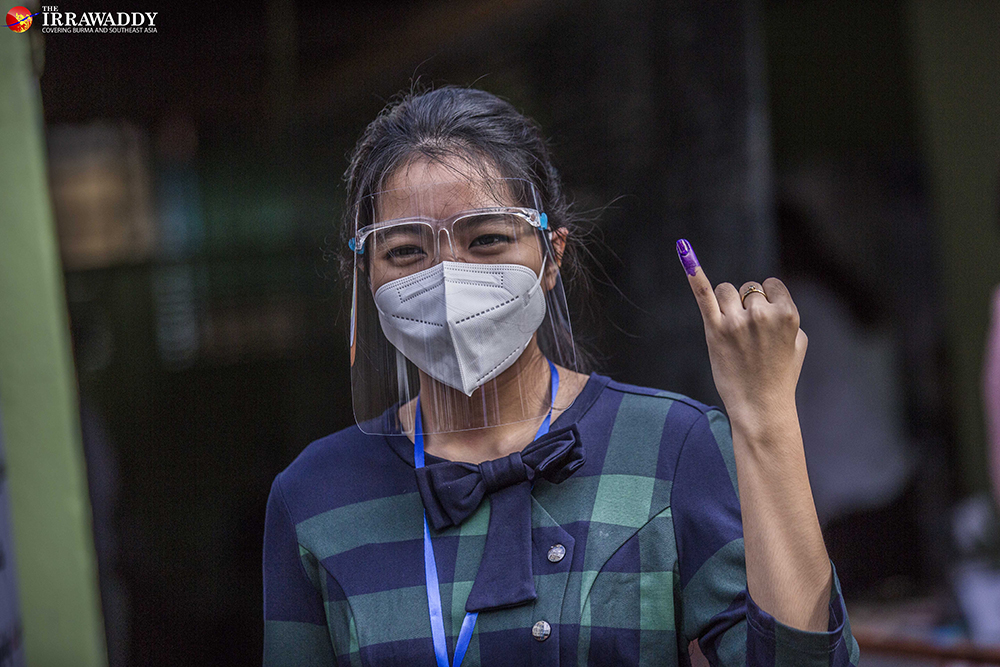
Defying predictions by some international observers and analysts of a low turnout due to COVID-19, long queues of people formed outside polling stations in Yangon, Mandalay and even in remote areas like Sumprabum Township in northern Myanmar in Kachin State before the opening of the polling stations at 6 a.m. on Sunday. Voters stood 6 feet apart and adorned themselves in face masks, face shields and gloves, while some came equipped with personal hand-sanitizer kits. In some places with high turnout, social distancing could not be practiced properly, however.
At polling stations, The Irrawaddy witnessed officials and volunteers delivering facemasks and face shields, while others conducted temperature checks and sprayed disinfectant on voters.
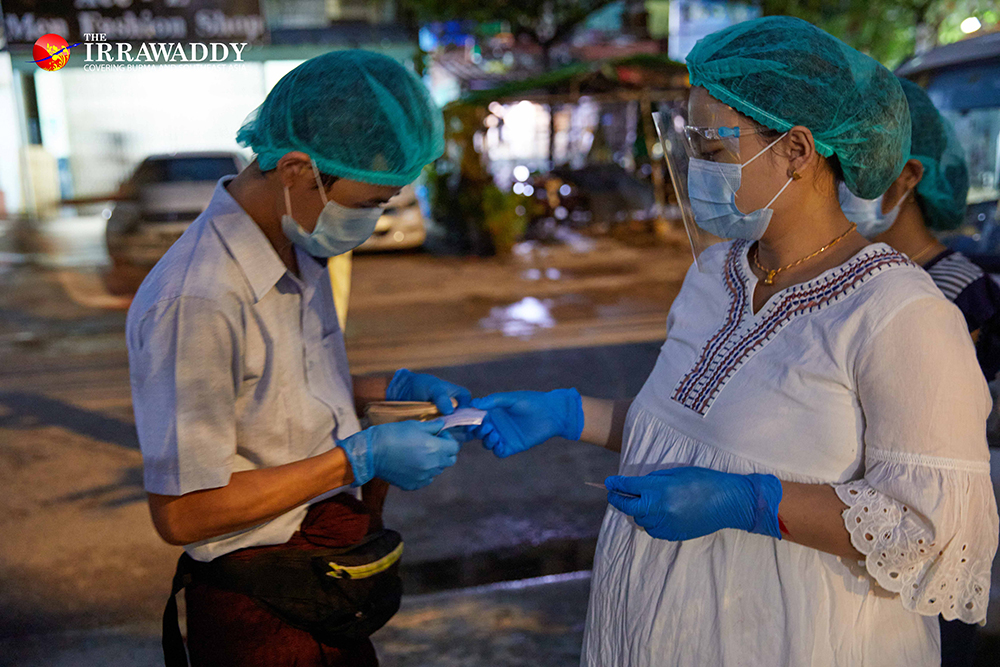
In Hlaing Thaya Township on Yangon’s outskirts, Daw Thein Han headed to a polling station in her neighborhood with her daughter after her morning prayers at 5 in the morning.
The 75-year-old said she voted for the ruling NLD, as she believed the party could help make people’s lives better.
Another voter, Ko Myo Khaing, said that while he was afraid of COVID-19, he went to the polling station as he believed the election was too important to miss.
“I voted for the NLD because we need a government that is good to the people,” he said.
In one of Myanmar’s northernmost townships, Kachin State’s Machanbaw, voters braved temperatures as low as 16 C to cast ballots at a polling station. In the state capital Myitkyina, voters started lining up at the stations at 4:30 a.m.
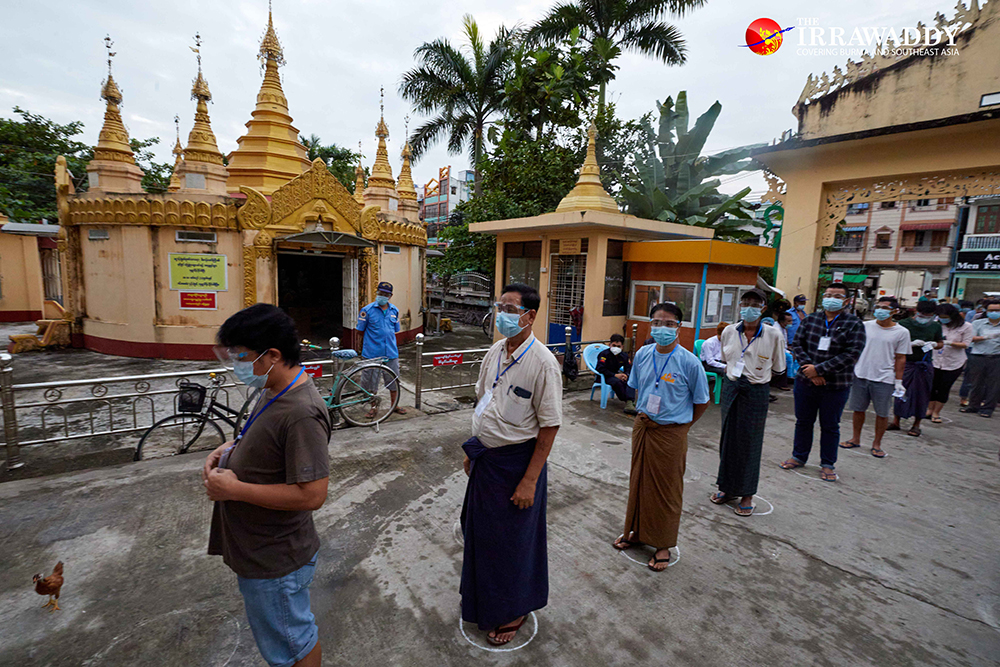
U Tun Win, a family member of a military serviceman in Myitkyina, said he was pleased to cast his vote this time, as the polling stations for servicemen and their families are no longer within military compounds, as they used to be.
“I am glad I could cast my ballot with freedom for the party I support,” he said, adding that he was pleased to see that the party he voted for performed well under the previous administration.
In Myanmar’s capital Naypyitaw, military chief Senior General Min Aung Hlaing and other senior officers voted along with their family members at a polling station at a military-owned shopping mall.
When The Irrawaddy asked him which party he voted for, the senior general said he backed the party that could work together with the military.
On whether he would accept the UEC’s announcement of the final results, given his recently expressed doubts about the UEC’s handling of the election, the military chief replied: “I will accept an election result that reflects the people’s desire.”
Outlook for ruling party
Ahead of the election, given the huge public support enjoyed by the ruling NLD, most observers at home and abroad said the party would win again but with a reduced majority due to the strong presence of ethnic parties in their home states, as the ruling party has almost completely neglected the aspirations of the ethnic people and failed to pursue genuine national reconciliation.
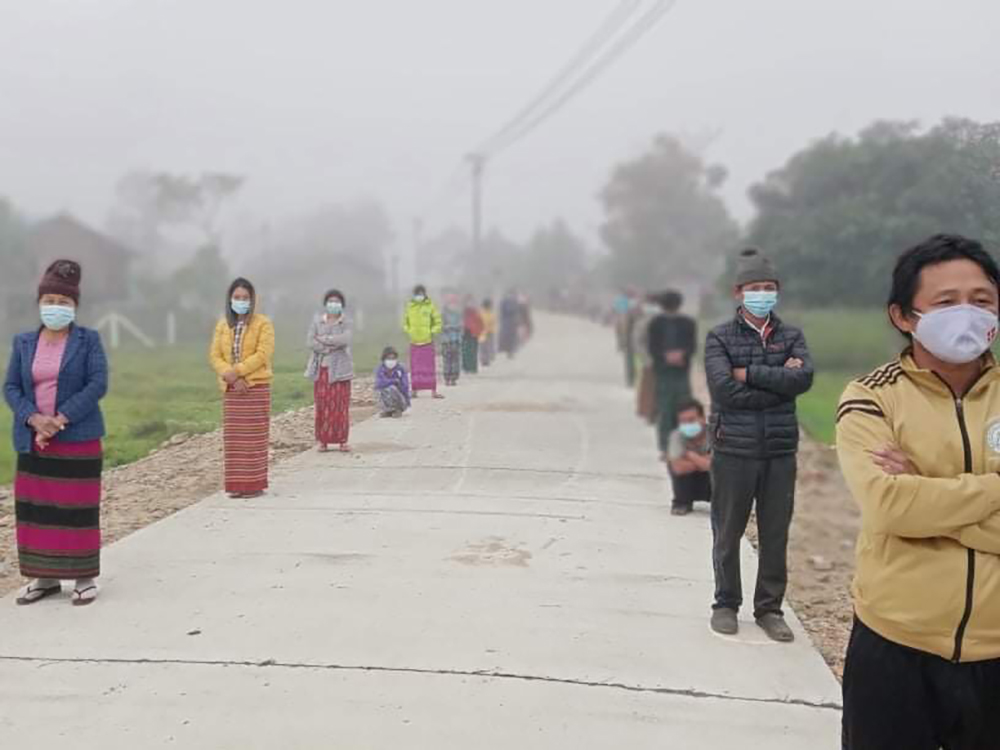
Moreover, the electoral body, the Union Election Commission (UEC), has been accused of (among other things) lacking consistency in deciding which areas would see voting canceled for security reasons. Some townships in Rakhine State were among those where the election was called off, with the UEC citing instability there.
While the NLD is heavily favored to win the election, not everyone is pleased with its performance.
Bertil Lintner, a long-time Myanmar observer, said the NLD had lost support among the ethnic minorities and among the urban middle class.
If the NLD wins enough seats to form a government, it will still have to deal with the country’s powerful military, especially when it comes to changing the military-drafted Constitution—something the NLD has failed to do so far.
Linter said it would be hard to change the Constitution, even if the NLD wins. More than 75 percent of all MPs have to vote in favor of any change to important clauses in the 2008 charter, and with the military controlling 25 percent of seats—forget about it, he said.
“Contrary to what some people think—’It needs only one soldier-MP to change sides’ to fix the Constitution—soldiers are soldiers and they obey orders. They don’t vote individually and in accordance with their conscience,” the Swedish journalist said.
Meanwhile, on Sunday, scenes of people heading enthusiastically to polling stations were repeated across Myanmar.
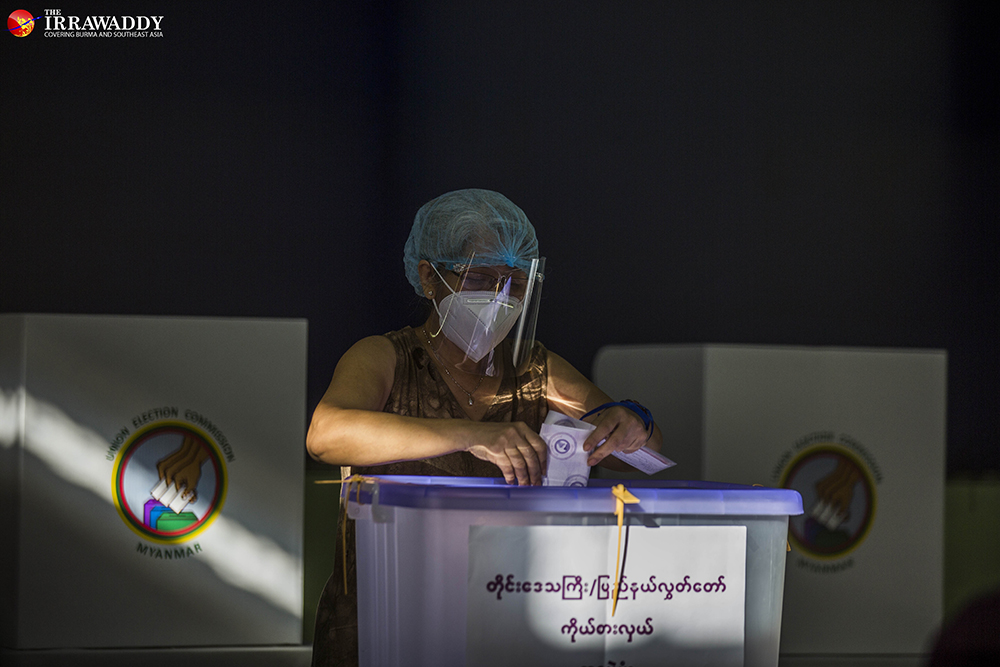
U Aung Myo Min, a human rights defender and executive director of Equality Myanmar, said it’s evident that people dared to cast votes amid the virus and even the threat of violence, including a few bomb scares.
“We people were dutiful amid difficulties. It means they still want more change,” he said, referring to the NLD’s previous campaign slogan, “Time to Change”.
“People want not only change, but also peace, and have done their job now. The [new] government just needs to do theirs.”
U Kyaw Shwe from Yangon’s Sanchaung Township said that even though he was afraid of being infected with the coronavirus, he ventured out to perform his civic duty by casting his vote. The 54-year-old encouraged others to go out and vote and not forfeit their rights as citizens.
“My expectation is to have lawmakers who will listen to our voices,” he said.
Reporting by Htet Naing Zaw in Naypyitaw and Nan Lwin, San Yamin Aung and Zaw Zaw Htwe in Yangon.
You may also like these stories:
Ahead of Sunday Polls, Election Office in Myanmar Attacked With Explosives
Militias Accused of Forcing Voters to Back Military Proxy Party in Northern Myanmar

















